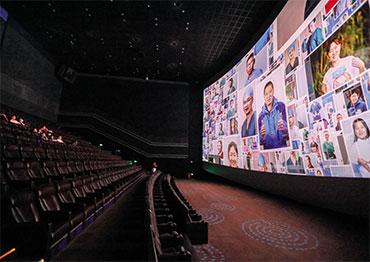Others see the withdrawal of hot money as positive, arguing the industry can mature and concentrate on producing quality content.
“Good movies stand a better chance in a smaller market,” Fang Li said. “As long as we have good ideas, we could get more people to make quality movies. We would rather take a smaller share. It’s also a good time to concentrate talent,” he added.
Song Wen said FIRST has seen an increase of submitted screenplays during their annual project scouting in recent years, from 732 in 2019 to 916 in 2021. Even in 2020, they received 857 submissions. “This year’s number is a record high,” Song Wen told NewsChina. “I’ve found that young people are really producing a lot of screenplays right now, which makes it a good time for storing up work and fostering talent. It’s good news.”
Song said four studios have turned to him for young directors to make movies since Spring Festival, but all of them already have work. “They’re in a prolific period. Even the pandemic can’t hold them back,” he said.
The pandemic also encouraged producers and investors to reevaluate their choices in projects. For example, many studios bet heavily on light-hearted comedies. Director Cai Chengjie told NewsChina he now chooses more touching human stories and said he has mentally prepared himself for low profits.
Song Wen hopes younger directors take on more social issues. “Some producers and directors are trying to avoid realistic topics and make lowbrow slapstick or historical comedies, but this leads audiences to believe that theaters aren’t places for serious cinema,” he said. Also, many in the industry mistakenly believed that young audiences preferred escapism at the cinema. Song pointed to 2020 drama Dying to Survive, which tackled the issue of high-priced leukemia drugs, saying the movie’s 3 billion yuan (US$461.5m) box office earnings revealed strong demand for movies that tackle social issues.
“Audiences may unexpectedly welcome such films after the theaters fully resume,” he said.
Theaters are exploring ways to increase attendance beyond government stimulus and tax reductions. Fang Li has called for theaters to move out of shopping malls, a strategy started by real estate giant and film company Wanda 20 years earlier. Fang argued that the high rents shopping malls charge unnecessarily pressured theaters. “Movies should not supplement shopping,” he said, adding theaters should open near residential communities and operate around the clock.
Others suggested theaters distinguish themselves with curation rather than display all available options like supermarket shelves. An insider told NewsChina he hoped authorities would give theaters more freedom to choose what movies they screen, including classic movies, and allow them to launch their own film festivals.
Some theaters have taken measures to attract audiences. Beijing Capital Cinema, for example, holds comedy performances and concerts, its monthly crosstalk shows drawing an average of 200 people. Although still falling short of recouping lost movie revenues, Yu Chao said their efforts have other value. “It might be a turning point to encourage additional revenue streams,” he said.
Although some predict theaters will keep losing viewers to internet platforms, many analysts believe theaters will always be the first window of the movie industry and provide a good chance for real social interaction.
“Movies cover public issues and sentiments, which are connected by public theaters,” Dai Jinhua, a professor who studies cinema at Peking University, told NewsChina.
Despite the paltry box office numbers during the Labor Day holiday, analysts chalked it up as a success, considering cities like Beijing and Shanghai had closed all cinemas because of the pandemic. According to Maoyan, the top two movies over Labor Day were new releases. Romance Stay with Me earned an 8.6/10 rating on the app, while US animated feature The Bad Guys received a 9.1. A cinema manager in Zhejiang Province surnamed Tao told Caijing magazine that there are excellent films waiting in the wings, postponed because of the pandemic.
Though the Palace is closed, Dong is still doing her part for the film industry. She posts regularly to followers on WeChat about movies like The Batman. She said she remains confident that audiences will return. “As long as the pandemic is under control, audiences will be back as soon as there’s a good movie to see,” she said.

 Old Version
Old Version



